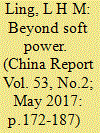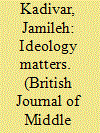| Srl | Item |
| 1 |
ID:
153118


|
|
|
|
|
| Summary/Abstract |
The concept of ‘soft power’ impoverishes our understanding of politics. It assumes (i) the world has never
encountered instances of ‘soft power’ before or knows no better when encountering it; (ii) culture cannot
have any interests, agency or impact of its own; and (iii) it cannot capture the state. History—especially
from India and China—debunks these assumptions. I propose a contrasting concept, cultural power.
It turns ‘soft power’ on its head by (i) articulating the state as ontology, not instrument; accordingly,
(ii) culture can generate its own centre (or centres) of gravitas that (iii) invariably outstrips the state in
purpose and identity. To demonstrate, I draw on recent filmic representations from India and China.
These replay the power of historical culture, like Hindu reincarnation and/or Confucian love, through
a contemporary venue. I conclude with some implications of cultural power for politics, in general, and
world politics, in particular.
|
|
|
|
|
|
|
|
|
|
|
|
|
|
|
|
| 2 |
ID:
187009


|
|
|
|
|
| Summary/Abstract |
Since its inception, Daesh has been regarded as a powerful actor by pundits, journalists, and politicians. This paper’s primary aim is to show how, and by what cultural means, Daesh became so powerful, and to study what lies behind its non-coercive power. This paper is part of an ongoing research project designed to study the different aspects of Daesh’s power. Drawing on Gramsci’s ‘hegemonic power,’ and Bourdieu’s ‘cultural capital’, the research explains what it is in Daesh’s cultural power that creates consent. In doing so, this study examines the various English and Arabic content of Daesh’s official media and the documents it has released since June 2014. Additionally, data has been collected from 19 semi-structured expert interviews together with other secondary sources. The findings of the study show that Daesh’s power goes beyond its coercive power. This research acknowledges that Daesh’s ideology is central to its power and is present in all aspects of the Khilafah’s activities, including in its multi-faceted power (i.e., its cultural, media, political and economic power).
|
|
|
|
|
|
|
|
|
|
|
|
|
|
|
|
| 3 |
ID:
054539


|
|
|